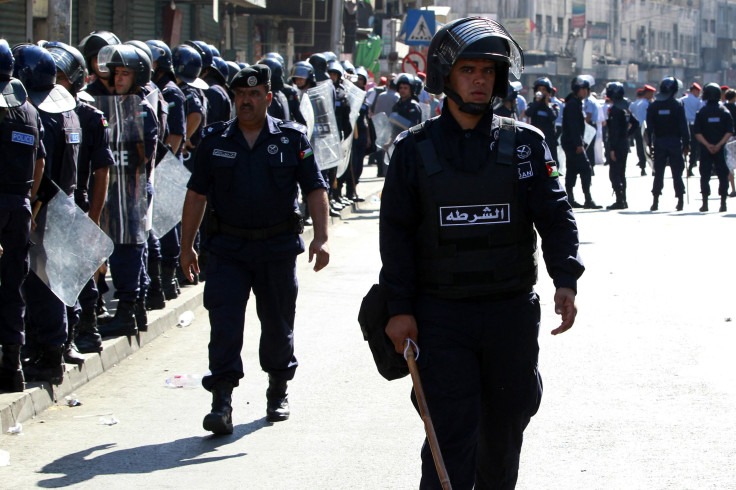The Lonely Kingdom: In Jordan, Militancy Threatens Decades Of Stability

Despite its location in one of the most volatile regions on earth, the small country of Jordan doesn’t make headlines very often.
That changed on Sunday, after officials reported their success in foiling a terrorist plot that was to have taken place in the capital city of Amman. Security forces have detained 11 people for their suspected connections to the conspiracy, which would have targeted two shopping malls and a neighborhood full of embassies.
The attack was slated to take place on Nov. 9, according to the BBC, to commemorate the bombings that took place on that same date in 2005 and killed 60 people at three upscale hotels.
In stopping the plot, Jordan will maintain its reputation for relative stability -- and it is a remarkable reputation, considering the circumstances.
Jordan, a country of 6 million, is a monarchy whose parliamentary elections are significantly flawed. It is surrounded by unrest on all sides: Iraq to the east, Syria to the North and Israel and the Palestinian territories to the west. The population is heavy on migrants, including hundreds of thousands of refugees from Syria and an enormous Palestinian population.
But none of this has led to major upheavals in Jordan, even as the Arab Spring revolution raged all around it.
Now, an uptick in turmoil nearby may be turning the tide for this peaceful kingdom. Although the 11 people arrested for the recent terrorist plot were all Jordanian, further investigations have uncovered links to both Syria and Iraq, raising fears that regional conflicts could threaten the kingdom's characteristic stability.
From Rebels in Syria…
Jordanian Minister of Information Samih al Maaytah told Reuters that the Jordanian militants of the foiled terror attack had a strong connection to Syria.
“This group arrived from Syria. They have been going in and out,” he said.
An anonymous security source added that the militants’ plans involved acquiring weapons from Syria.
Jordan has lately struggled to prevent a spillover of the violence from Syria, where a bloody 19-month conflict has cost about 30,000 lives and prompted hundreds of thousands of Syrians to flee the country.
About 210,000 of those refugees have ended up in Jordan, according to the UN. Though Jordan has set up refugee camps to accommodate these civilians, the ongoing influx raises security concerns since foreign militant groups have infiltrated the Syrian rebel movement.
Meanwhile, militants in Jordan -- mostly Salafists who adhere to an extreme sect of Islam outlawed in the kingdom -- have attempted to cross into Syria to bring their own firepower to their allies within the rebellion. Jordan is working to stop these militants from crossing into Syria, fearing that such involvement could motivate the Syrian regime to retaliate on Jordanian soil.
On Monday, a Jordanian soldier was killed during an attempt to stop a group of militants from crossing into Syria; it was the first Jordanian military death to result from the Syrian crisis.
… to al-Qaeda in Iraq
Iraqi militants also played a role in the Amman terror plot. According to Maaytah, Jordanian security officials uncovered online communications wherein Iraqi operatives shared weapons-building expertise with the Jordanian militants.
Al-Qaeda in Iraq, or AQI, was officially formed in 2003. Its ties to Jordanian militants have always been strong; in fact, the group first coalesced under the leadership of a Salafist Jordanian, Abu Musab al-Zarqawi.
AQI has seen a resurgence since the withdrawal of American troops from Iraq in December of this year. It is a major perpetrator of violence in the ongoing Iraqi insurgency, which seeks to topple the Shia-led government in Baghdad.
Those provincial aims once distanced AQI from the broader al-Qaeda movement, but the Syrian uprising has changed all that. That the turmoil -- which gives al-Qaeda an opening to assert itself and win allies -- is taking place in a country that shares a 420-mile border with Iraq suddenly makes AQI a very useful affiliate for al-Qaeda.
This, in, turn, strengthens the link between AQI and the Salafist extremists in Jordan, who also support the Syrian rebellion. As Jordan cracks down on its own insurgents, then, it increasingly risks provoking a response from militants in not one but two tumultuous neighboring countries.
Home Turf
Until now, a number of factors have contributed to the kingdom’s ability to inure itself from surrounding conflicts. One is its lack of natural resources, which lessens the potential for divisive profiteering; another is a history of staunch support from the West.
Jordan’s constitutional monarchy is headed up by King Abdullah II, a generally well-regarded monarch who is more comfortable communicating in English than in Arabic. He has a friendly relationship with the West. Jordan has been officially at peace with Israel since 1994, and enjoys military and economic support from the United States.
But Jordan’s pro-West stance is exactly what makes the kingdom a target for those extremists who oppose all U.S. presence in the region.
Furthermore, Jordan’s position is only secure as long as the government maintains domestic stability. And despite King Abdullah’s popularity both at home and abroad, the Arab Spring has occasioned some stirrings of dissent at home.
Facing calls for a healthier economy and more legitimate parliamentary electoral system, the king has invested heavily in social programs and promised eventual political reforms. Although Abdullah’s mandate is still strong, his critics are many -- and increasing.
The foiled attack in Amman is a victory for the monarchy, especially since the specter of violence tends to make Jordanian dissenters less enthusiastic about fomenting unrest. But with Syria and Iraq imploding just over the borderline, the kingdom may find it increasingly difficult to keep its own problems from bubbling over.
© Copyright IBTimes 2025. All rights reserved.






















